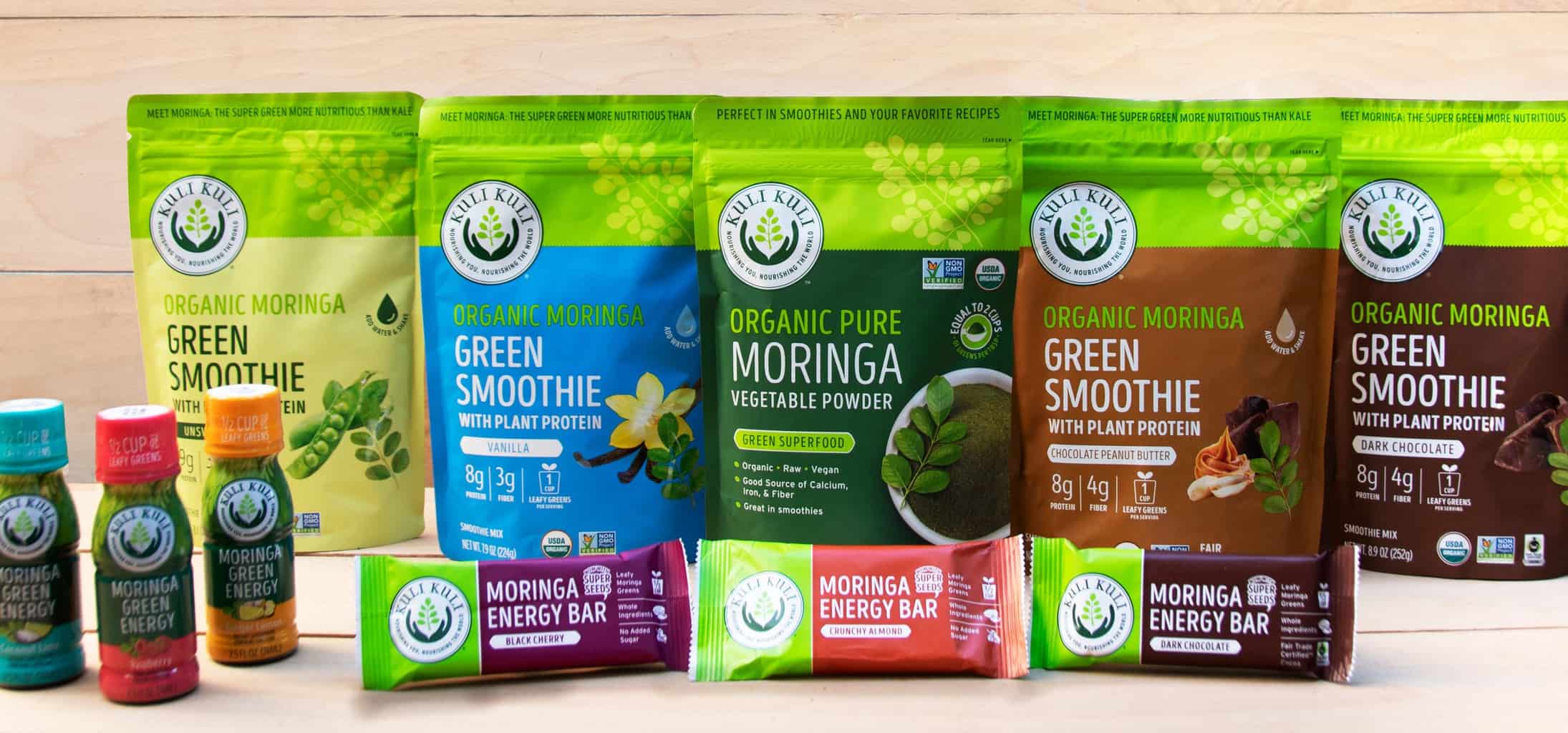Part of an ongoing series about interesting, #socially responsible food companies.
What the company does: Kuli Kuli sells delicious and sustainably-sourced products made with moringa leaves, one of the most nutrient-dense plants on the planet.
How the company is socially responsible:
A Nutritional Powerhouse, Grown From the Cleanest Sources
The leaves of the moringa tree, typically found in the tropics, are distantly related to cruciferous vegetables like broccoli and cabbage. The plant packs a nutritional punch: it’s protein-rich, packed with essential amino acids, and contains 27 vitamins and 46 antioxidants. Compared to kale, another “superfood” vegetable, moringa has twice as much protein, four times more iron, three times more calcium, and 2.5 times more fiber. Kuli Kuli’s moringa products makes it easy to eat your daily recommended servings of vegetables.
Kuli Kuli obtains its moringa from the highest-quality and most sustainable sources, and third-party research has verified that the company’s “Pure Moringa Powder” product is the cleanest on the market.
Kuli Kuli guarantees customers that:
- They only source from remote, rural areas to ensure that their products are grown far from any industrial pollution that could find its way into soil
- Their moringa is harvested from the cleanest and most nutrient-dense parts of the tree
- They hold their suppliers to high standards, vetting them based on micro, nutritional, and heavy metal specifications (Kuli Kuli accepts less than 20 percent of suppliers who apply)
- Their products are inspected and packaged in the U.S. to ensure that they meet Kuli Kuli’s standards before they are sent to market
Supporting Suppliers
Harvesting from moringa trees requires little water and it can also help restore nutrient-depleted soil. Therefore, the moringa tree is an ideal crop for farmers to cultivate, especially if they are seeking to supplement their income.
Kuli Kuli works with approximately 2,400 small-scale farmers and women’s cooperatives across the globe, providing them with fair wages, ongoing training, technical assistance, and a guarantee of purchase. Kuli Kuli’s partnerships enable their producers and suppliers to scale their businesses and improve the health of their communities.
Kuli Kuli’s commitment to sourcing sustainably has earned them several titles and accolades, including the 2018 Whole Foods Women-Led Entrepreneurship Supplier of the Year Award.
Protecting the environment
Moringa tree planting has both local and global environmental benefits. It can grow in sandy or depleted soil, making it an ideal candidate for reforestation projects. The trees have also been shown to prevent erosion, act as wind barriers, improve hydrological cycles, and provide much-needed shade that protects nearby crops from damage caused by intense heat or sunlight.
According to Kuli Kuli, moringa trees can also absorb up to 900 kilograms of carbon dioxide, a rate twenty times higher than general vegetation.
Company Origin:
Lisa Curtis first conceptualized Kuli Kuli in 2010 when she was only 22 years old. At the time, she was working as a Peace Corps volunteer in Niger, West Africa. As a vegetarian, she struggled to find locally-available food to eat. Until then, her diet in Niger had consisted mainly of rice and millet, which left her feeling tired and deprived. When Lisa mentioned her unsatisfying diet to the female villagers at the local community center, they suggested she try eating moringa.
After trying it for herself, Lisa was inspired to start a company that would both spread the nutritional benefits of moringa across the globe and also support the women who produced it. She and Jordan Moncharmont officially co-founded Kuli Kuli in 2011, and their products first made it to market in 2014. Today, the company is a multi-million dollar social enterprise that sells its products in more than 7000 stores.
In 2017, Lisa was honored with the prestigious Forbes 30 Under 30 Award for her work in social entrepreneurship.
Latest “socially responsible” project: Kuli Kuli recently closed a round of Series B funding, raising a grand total of $5 million. Curtis announced that these additional funds will be used to further scale their moringa powder, moringa shot, and moringa bar products.
Any additional projects or products:
In 2015 Kuli Kuli partnered with Whole Foods, the Clinton Foundation’s Haiti Program, the Smallholder Farmers Alliance, and local Haitian farmers. Together, they succeeded in planting hundreds of trees in an effort to reforest the Haitian landscape. Kuli Kuli and the Smallholder Farmers Alliance also worked closely with local farmers to teach them farming techniques in the event of droughts caused by climate change.
Where to buy: https://www.kulikulifoods.com/products and in select stores across the U.S., including Whole Foods Markets, Sprouts and Kroger.
Fact Sheet and Details:
- Date founded: 2014
- Main office: Oakland, California
- Core products: Moringa Superfood Bars, Pure Organic Moringa Powder, Moringa Tea, Moringa Green Energy Shots, Moringa Greens & Proteins Smoothie Mix
- Area(s) served: United States
- Founder(s): Lisa Curtis, Jordan Moncharmont
- CEO: Lisa Curtis
- Website: https://www.kulikulifoods.com/
- E-mail: hello@kulikulifoods.com
Social Media
- Twitter: https://twitter.com/kulikulifoods
- Facebook: https://www.facebook.com/kulikulifoods
- Instagram: https://www.instagram.com/kulikulifoods
- Linkedin: https://www.linkedin.com/company/kulikulifoods
- Pinterest: http://www.pinterest.com/kulikulifoods/
From Around the Web:
- Moringa, the Next Superfood? (Washington Post)
- Three-Fold Mission Powers Kuli Kuli To Success (Your Mark on the World)
- Women in Health & Wellness: Interview with Lisa Curtis, founder and CEO of Kuli Kuli (Super Girls Club)
- Advice From Founder of Kuli Kuli, Lisa Curtis on Social Entrepreneurship (Change Creator)
- Why Moringa Is the New Superfood You Need to Know About (Vogue)
- Kuli Kuli Raises $4.25 Million to Make Moringa a Mainstay in the U.S. Diet (Tech Crunch)
- Moringa Superfood Producer Kuli Kuli Gets $5m in Funding Led by Kellogg (Food Dive)
- Chefs Are Waking Up to the Lean, Green Protein Power of Moringa (Bloomberg)
- This Extreme Extrovert Started a Multimillion-Dollar Wellness Snack Company After Her Stint in the Peace Corps Was Cut Short (Entrepreneur)


